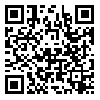Volume 17, Issue 8 (November 2019)
Nursing and Midwifery Journal 2019, 17(8): 592-602 |
Back to browse issues page
Download citation:
BibTeX | RIS | EndNote | Medlars | ProCite | Reference Manager | RefWorks
Send citation to:



BibTeX | RIS | EndNote | Medlars | ProCite | Reference Manager | RefWorks
Send citation to:
HasanZadeh H, Zeinali A. THE ROLE OF SPOUSE INTIMACY, ATTACHMENT STYLES AND MOTHER POSITIVE AND NEGATIVE AFFECT IN PREDICTING MOTHER-CHILD EMOTIONAL BOND IN DURING PREGNANCY. Nursing and Midwifery Journal 2019; 17 (8) :592-602
URL: http://unmf.umsu.ac.ir/article-1-3681-en.html
URL: http://unmf.umsu.ac.ir/article-1-3681-en.html
1- MA of Clinical Psychology, Department of Psychology, Urmia Branch, Islamic Azad University, Urmia, Iran
2- Associate Professor, Department of Psychology, Urmia Branch, Islamic Azad University, Urmia, Iran (Corresponding Author) ,cognition20@yahoo.com
2- Associate Professor, Department of Psychology, Urmia Branch, Islamic Azad University, Urmia, Iran (Corresponding Author) ,
Abstract: (4131 Views)
Background & Aims: Pregnancy period is a one of the most important stages in the life of women and in this period damage to the mother-child relationship causes creating grounds for mental disorders in a child. The most important factors related to mother-child relationship include spouse intimacy, attachment styles and mother positive and negative affect. As a result, Present research aimed to investigate the role of spouse intimacy, attachment styles and mother positive and negative affect in predicting mother-child emotional bond in during pregnancy. Material & Methods: This study was a cross-sectional from type of correlation. The research population was included pregnant women referred to clinics and doctor's office of obstetrics and gynecology of Urmia city in the first half of summer, 2018. In this research, 270 people were selected by random cluster sampling method. The research tools were questionnaire of spouse intimacy (Walker & Tompson, 1983), attachment styles (Van Oudenhoven & et al, 2003), positive and negative affect (Watson & et al, 1988) and mother-child emotional bond (Kitamura & et al, 2015). Data were analyzed by Pearson correlation coefficient and multiple regression methods. Results: The finding showed that spouse intimacy, secure attachment style and positive affect had a positive and significant relationship with mother-child emotional bond and preoccupied and fearful attachment styles and negative affect had a negative and significant relationship with mother-child emotional bond (p0/05). Also the variables of spouse intimacy, attachment styles and mother positive and negative affect were able to predict 18/4 percent of the variance of mother-child emotional bond (p
Keywords: Spouse Intimacy, Attachment Styles, Positive and Negative Affect, Mother-Child Emotional Bond, Pregnancy
Type of Study: Research |
Subject:
روانپزشکی- روان شناسی
Send email to the article author
| Rights and permissions | |
 |
This work is licensed under a Creative Commons Attribution-NonCommercial 4.0 International License. |






 gmail.com, unmf
gmail.com, unmf